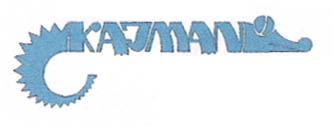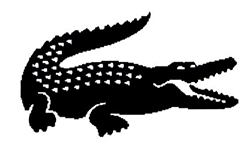Today, the General Court of the European Union rendered its judgement in case T-364/13 concerning Lacoste’s objection filed with the Office for Harmonization in the Internal Market (OHIM) of the following logo for clothing, footwear, bags, as well as pet cushions, and real estate lettings:

The company applying for its registration is a Polish partnership located in Chojnice by the name of “Eugenia Mocek i Jadwiga Wenta KAJMAN Firma Handlowo-Usługowo Produkcyjna” (KAJMAN translates to “caiman” ). The Lacoste brand is probably well known to readers but to avoid any doubt, it sells clothing, perfumes and accessories. Lacoste claims Kajman’s logo above creates confusion with its own logo below:

Following Lacoste’s objection, OHIM refused to register the Polish company’s mark. The General Court of the EU upheld OHIM’s decision, justifying that “the repute of the Lacoste crocodile is such as to prevent the registration of crocodile or caiman figures for leather goods, clothing and footwear .”
Let’s begin from the most important aspect. What is a trademark having a reputation ? One can look for its definition in Polish and EU legal acts to no avail. However, this concept is widespread and often used as a crucial argument in court disputes. The first EU judgement in which a renowned trademark was defined was in the General Motors Corporation case (C-375/97). The court directed in determining whether a trademark has a reputation, the following factors are of importance: the number of customers of a given product, availability of the product holding the relevant trademark, its distinctiveness, market share, geographical extent and duration of its use, as well as the extent of promoting activities.Per the Court’s press release: “In particular, the Court considers that the representation of the Mocek and Wenta caiman might be perceived as a variant of the representation of the Lacoste crocodile, the latter being widely known to the public .”
The special status of renowned trademarks justifies their special treatment. This can clearly be seen in Art. 132, section 2 item 3 of the Industrial Property Law, stipulating that the right of protection for a trademark shall not be granted if it “is identical or similar to a renowned trademark registered or applied for registration with an earlier priority (provided the latter is subsequently registered) on behalf of another party for any kind of goods, if it without due cause would bring an unfair advantage to the applicant or be detrimental to the distinctive character or the reputation of the earlier trademark. The above provision shall apply to well-known trademarks accordingly .”Thus for Art. 132, section 2, item 3 to be applied all stipulated prerequisites must occur simultaneously.
The Polish firm has 60 days to appeal the General Court’s decision , limited to points of law, to the EU Court of Justice. The dispute between Kajman and Lacoste is strikingly similar to an earlier case in which the appeal of the Italian fashion house Gucci was dismissed against the registration of the GUCIO mark, owned by a Polish manufacturer of children’s footwear. In that case the Polish Patent Office considered in the course of trade both marks did not mislead consumers. The case was appealed to the Voivodeship Administrative Court in Warsaw, which upheld the position of the Patent Office and dismissed Gucci’s action (ref. No VI SA/Wa 807/10) on the grounds there was no similarity between the two marks. Here the important fact was that Gucci sells highly exclusive goods, unlike Gucio’s ordinary children’s footwear.
As you can see, fashion law can be surprising and multidimensional.


